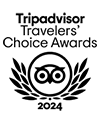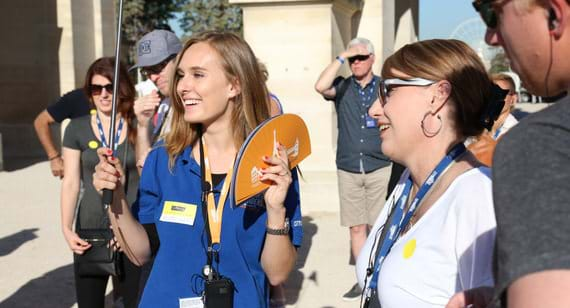Do you plan on visiting the Eiffel Tower this year, or are you going to France for a vacation? Well, you might not need to start studying the local language just yet, but learning a few simple French phrases for travelers can make a huge impact on how much you'll enjoy your trip. Of course, when you take one of our Paris tours, you will have an expert English-speaking guide accompanying you, but what happens when you're out there alone?
French is among the most spoken languages in the world, and had a huge influence over the development of English. However, even if you see a lot of similarities in the spellings of words, you still need be wary of the tricky pronunciation, and 'false friends' as appearances can be very deceiving!
Start your Day with Bonjour!
Just like virtually every other country in the world, France begins its day with a bonjour, or 'good day'. This is also used to greet the people you come into contact with, like hotel reception, waiters at cafés and perfect strangers. You can even try it out on your City Wonders guide who will be able to help you with the correct pronunciation (bon-ZHOOR). No matter the circumstances, a bonjour well said is a first step towards a more gratifying interaction with Parisians.
When the day is noticeably coming to an end, it's time to shift gears to yet another expression: bonsoir, or 'good evening'. This is perfect for when you greet the maitre at a restaurant, a bartender for a cocktail, or anyone else you rub shoulders with from dusk to bedtime. Even before your Eiffel Tower Evening Tour with Seine River Cruise A good pronunciation of bonsoir (bon-SWAH) will add an extra level of elegance, and may even impress.
Last on the list is bonne nuit, or 'good night'. This is only said when the evening is finished and everyone is going home, to the night porter on your way upstairs, or to that special someone as you turn out the lights. Well said, (bon-NUI) is that final touch of class no trip to Paris can be without.
Do you speak English?
Another phrase that is sure to help you on your way is Parlez-vous anglais? (parlay-VOO-zonglay?), or 'Do you speak English?' . We need to be honest with ourselves here and admit that if we don't speak French, and they don't speak English, the conversation isn't going to go very far. Mastering this phrase is the key to good manners. If the answer is non, simply say désolée (day-soh-lee) for 'Sorry' and then say Je ne parle pas français (zhe-ne-parhl-PA-fronh-say) to tell them 'I do not speak French'.
To say where you are from is easy enough, and it might earn you enough points for some great help. Je suis américain/e (zhe-sooi-zun-ameriCAHN or CAIHN for a girl) means 'I am American'.
Speaking in French
There are so many resources available to travelers today to get the language they need on the fly. Even drilling yourself with an app on the flight over will be of enormous benefit. The main thing is to realize that you are in a foreign country with a rich and proud language tradition, so any effort you make to approach it will be richly rewarded. You can't be shy. Here are some final phrases to send you on your way:
Comment vous-appelez vous? (kommon-voos-aa-pay-lay-voo) - 'What is your name?'
Je m’appelle…(zhe-maa-pel) - 'My name is...'
Merci ( merh-see) - 'Thank you'
Bon Appetit (bohn-aa-pay-tee) - 'Let's eat'
Enchantée (ehn-shon-tay) - 'Nice to meet you'
Bon voyage! (bon-voyaje) - 'Have a nice trip!'


